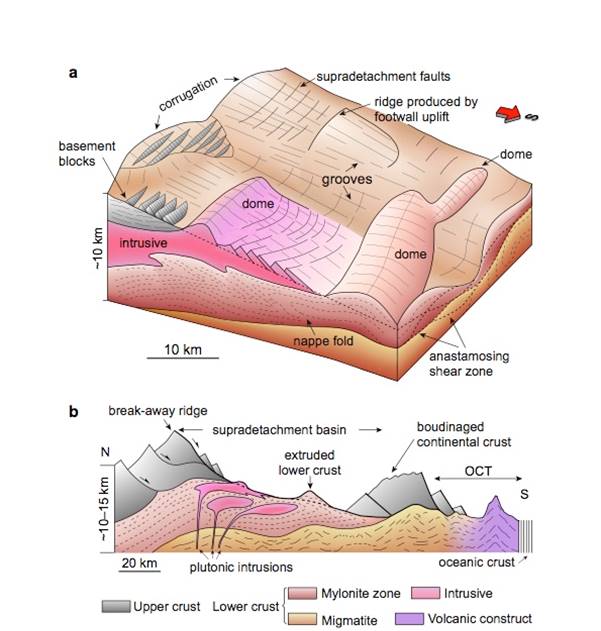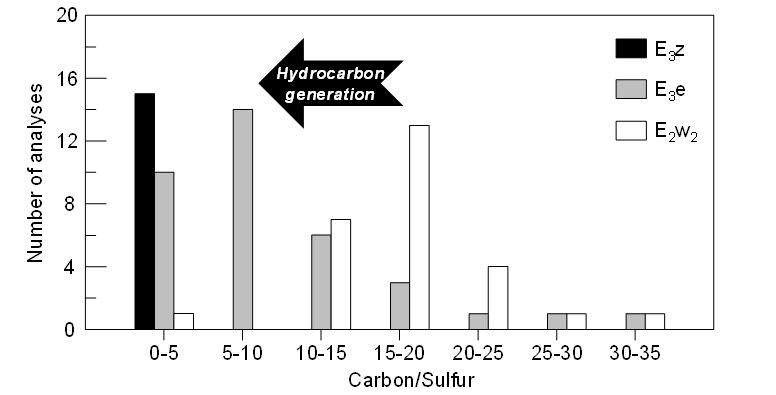搜索结果: 1-15 共查到“理学 South China Sea”相关记录30条 . 查询时间(0.171 秒)
中国地质大学科学技术发展院叶青(博士研究生),梅廉夫*等 资源学院 构造与油气资源教育部重点实验室 Earth-Science Reviews, Dec 2018, The Late Cretaceous tectonic evolution of the South China Sea area: An overview, and new perspectives from 3D seismic reflection data
南海;北部;陆缘盆地;结构;演化方面
2021/10/20
日前,地球科学Earth-Science Reviews刊发了中国地质大学资源学院和构造与油气资源教育部重点实验室梅廉夫教授团队关于南海北部陆缘盆地结构和演化方面的成果。论文第一单位为构造与油气资源教育部重点实验室,第一作者为博士研究生叶青,通讯作者为梅廉夫教授。

中国地质大学科学技术发展院邓洪旦*,任建业 等,海洋学院. Nature Communications(2020), South China Sea documents the transition from wide continental rift to continental break up(图)
三维;高清;地震数据;南海北部;被动陆缘大型;拆离;断层
2021/10/15
近日,中国地质大学海洋学院邓洪旦博士和任建业教授在国际著名科学期刊《Nature Communications》发表题为“South China Sea documents the transition from wide continental rift to continental break up”的学术论文。
中国地质大学科学技术发展院孙启良* 等,海洋学院,GSA Bulletin(2020),Post-rift magmatism on the northern South China Sea margin
南海北部;裂后期;岩浆活动;时间;控制因素;岩浆系统;三维结构
2021/10/15
近日,中国地质大学海洋学院孙启良教授在国际地学领域期刊《Geological Society of American Bulletin》发表了题为《南海裂后期岩浆活动》的学术论文,该文阐释了南海北部裂后期岩浆活动时间、控制因素和岩浆系统的三维结构等。孙启良教授为第一兼通讯作者,合作者包括中国地质大学海洋学院解习农教授以及来自英国加里夫大学的Tiago Alves教授、中科院南海所赵明辉研究员、法国...

中国地质大学科学技术发展院权永彬, 郝芳* 等. 资源学院 构造与油气资源教育部重点实验室 GSA Bulletin, December, 2019. Paleosalinity assessment and its influence on source rock deposition in the western Pearl River Mouth Basin, South China Sea(图)
古水体盐度;恢复;对烃源岩;发育质量;影响方面;研究成果。
2021/10/15
近日,美国地质学会会刊《GSA Bulletin》刊发了中国地质大学资源学院和构造与油气资源教育部重点实验室权永彬副教授关于古水体盐度恢复及其对烃源岩发育质量影响。
Corals Die as Global Warming Collides with Local Weather in the South China Sea
Corals Die Global Warming Collides Local Weather South China Sea
2017/3/30
In the South China Sea, a 2°C rise in the sea surface temperature in June 2015 was amplified to produce a 6°C rise on Dongsha Atoll, a shallow coral reef ecosystem, killing approximately 40 percent of...
MARINE GEOID UNDULATION ASSESSMENT OVER SOUTH CHINA SEA USING GLOBAL GEOPOTENTIAL MODELS AND AIRBORNE GRAVITY DATA
Global Geopotential Model Geoid Undulations Airborne Gravity Gravity Missions
2016/10/14
Global geopotential models (GGMs) are vital in computing global geoid undulations heights. Based on the ellipsoidal height by Global Navigation Satellite System (GNSS) observations, the accurate ortho...
A History of Taiwan/US Oceanographic Research in the South China Sea
History of Taiwan/US Oceanographic Research South China Sea
2015/7/13
Oceanography is a relatively new field in Taiwan. As a maritime nation surrounded by water, the societal need to understand the seas has long been recognized. From the path of the Kuroshio to the path...
Turbulent Properties of Internal Waves in the South China Sea
Turbulent Properties Internal Waves South China Sea
2015/7/13
Luzon Strait and South China Sea waters are among the most energetic internal wave environments in the global ocean. Strong tides and stratification in Luzon Strait give rise to internal waves that pr...
Modeling and Prediction of Internal Waves in the South China Sea
Modeling and Prediction Internal Waves South China Sea
2015/7/13
Nonlinear internal solitary waves generated within Luzon Strait move westward across the northern South China Sea, refract around Dongsha Atoll, and dissipate on the Chinese continental shelf after a ...
7th South China Sea Tsunami Workshop, Taiwan, China
China Sea Tsunami Workshop Taiwan China financial
2014/11/3
The 7th South China Sea Tsunami Workshop (SCSTW-7) will be held on November 17-22, 2014 at National Museum of Natural Science, Taichung, Taiwan, China. As one of the SCSTW-7′s sponsors, BICTAM is plea...
Paleoceanography of the South China Sea and the western equatorial Pacific: Testing linkages between Indonesian Seaway closure and sea level change during the Middle to Late Miocene (~13--5 Ma)
Paleoceanography the equator the equator of the south China sea west Pacific sea level climate change
2014/10/22
The tectonic opening and closing of ocean gateways played a key role in global climate change during the Cenozoic. Although changes in these gateways affected ocean circulation and heat transport, man...
Trace metal cycling in the deep water of the South China Sea: The composition, sources, and fluxes of sinking particles
Trace metal cycling in the deep water the South China Sea composition sources fluxes of sinking particles
2014/4/8
Moored sediment traps were deployed for 1 yr at depths of 120, 600, and 3500 m in the water column to investigate the trace metal (M) (Al, Ti, V, Cr, Mn, Fe, Co, Ni, Cu, and Zn) composition, sources, ...
Metaproteomic characterization of dissolved organic matter in the water column of the South China Sea
Metaproteomic characterization dissolved organic matter water column South China Sea
2014/4/4
We characterized dissolved organic matter (DOM; < 0.7 μm in size) collected from the surface (10-m and 75-m) and bathypelagic (3000-m) layers in the South China Sea using the shotgun proteomic approac...
Written records of historical tsunamis in the northeastern South China Sea – challenges associated with developing a new integrated database
Written records historical tsunamis the northeastern South China Sea challenges associated developing
2010/10/21
Comprehensive analysis of 15 previously published regional databases incorporating more than 100 sources leads to a newly revised historical tsunami database for the northeastern (NE) region of the So...
The Mekong River plume fuels nitrogen fixation and determines phytoplankton species distribution in the South China Sea during low and high discharge season
The Mekong River plume fuels nitrogen fixation determines phytoplankton species distribution the South China Sea low and high discharge season
2014/4/17
The influence of the Mekong River (South China Sea) on N2 fixation and phytoplankton distribution was investigated during the lowest- and highest-discharge seasons (April 2007 and September 2008, resp...

